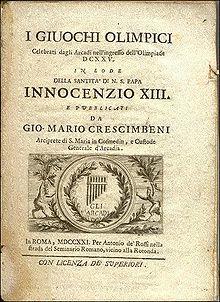Giovanni Mario Crescimbeni (October 9, 1663 – March 8, 1728) was an Italian critic and poet. Crescimbeni was born in Macerata, which was then part of the Papal States.
Biography
Born in Macerata and educated by a French priest at Rome, he entered the Jesuits' college of his native town, where he produced a tragedy on the story of Darius, and versified the Pharsalia. In 1679 he received the degree of doctor of laws, and in 1680 he moved again to Rome.[1]
The study of Vincenzo Filicaja and Niccolò Leonico having convinced him that he and all his contemporaries were working in a wrong direction, he resolved to attempt a general reform. In 1690, in conjunction with fourteen others, he founded the celebrated Academy of Arcadians, and began the contest against false taste and its adherents. The academy was most successful; branch societies were opened in all the principal cities of Italy; and the influence of Giambattista Marino, opposed by the simplicity and elegance of such models as Angelo di Costanzo, soon died away.[1]
Crescimbeni officiated as secretary to the Arcadians for thirty-eight years. In 1705 he was made canon of Santa Maria in Cosmedin; in 1715 he obtained the chief curacy attached to the same church; and about two months before he died (1728) he was admitted a member of the order of Jesus. His principal work is the Istoria della volgar poesia (1698), an estimate of all the poets of Italy, past and contemporary, which may yet be consulted with advantage.[1]
The most important of his numerous other publications are the Commentarii (5 volumes, 1702–1711), and La Bellezza della volgar poezia (1700).[1]
References
- ^ a b c d
 One or more of the preceding sentences incorporates text from a publication now in the public domain: Chisholm, Hugh, ed. (1911). "Crescimbeni, Giovanni Mario". Encyclopædia Britannica. 7 (11th ed.). Cambridge University Press. pp. 411–412.
One or more of the preceding sentences incorporates text from a publication now in the public domain: Chisholm, Hugh, ed. (1911). "Crescimbeni, Giovanni Mario". Encyclopædia Britannica. 7 (11th ed.). Cambridge University Press. pp. 411–412.
External links
- Herbermann, Charles, ed. (1913). . Catholic Encyclopedia. New York: Robert Appleton Company.
